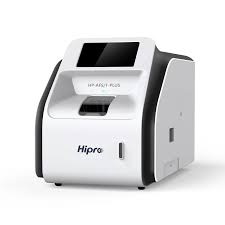


Immunoassay analyzers are advanced laboratory instruments used to detect and measure specific proteins, hormones, or other molecules in biological samples (such as blood, urine, or tissue fluids) through the principle of immunoassay. Read more
These analyzers are widely used in clinical laboratories to perform diagnostic tests that detect diseases, infections, or monitor conditions such as hormone levels, cardiac markers, or tumor markers.
High Sensitivity: Immunoassay analyzers are highly sensitive and can detect trace amounts of analytes, making them essential in diagnostic testing.
Automated Processing: Modern analyzers offer automated sample processing, from reagent handling to result reporting, which improves throughput and reduces the risk of human error.
Wide Range of Tests: These devices can perform a variety of tests, including hormone assays (like TSH and insulin), infectious disease screening (such as HIV or hepatitis markers), drug testing, cancer markers, and cardiac tests.
Multiplexing Capabilities: Some analyzers allow for simultaneous detection of multiple analytes in a single sample, which increases efficiency and reduces sample volumes.
Different Technologies:
| Specifications | Descriptions |
|---|---|

Lorem, ipsum dolor sit amet consectetur adipisicing elit. Exercitationem, facere nesciunt doloremque nobis debitis sint?
Your experience on this site will be improved by allowing cookies.